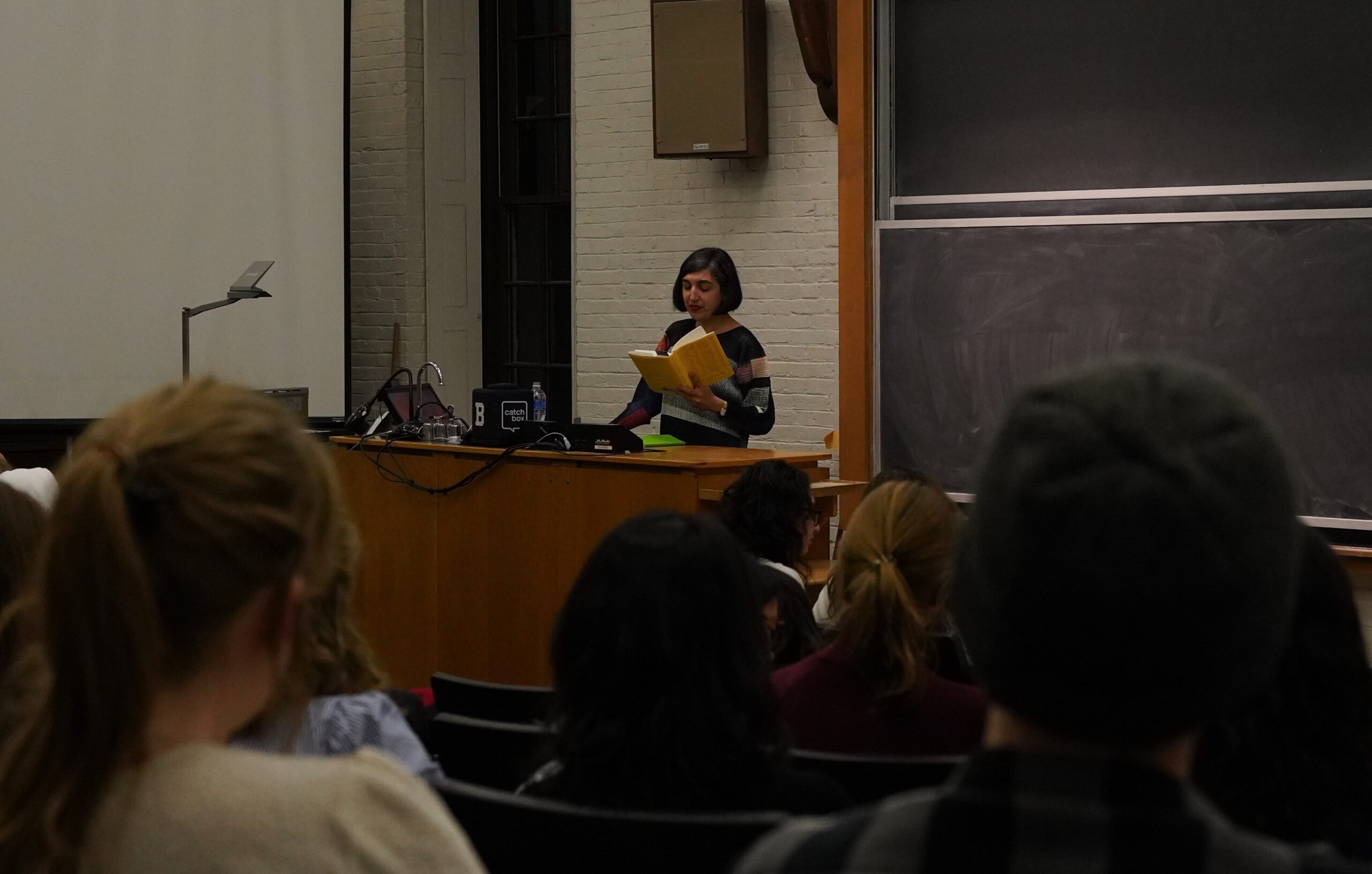Pulitzer Prize Finalist Elif Batuman speaks on autofiction, editing and tampons in ADP Society lecture
March 3, 2023

Laughter filled Searles 315 on Wednesday evening as writer Elif Batuman read from her 2022 novel, “Either/Or,” a sequel to her 2018 Pulitzer Prize Finalist novel, “The Idiot.”
“‘I had tried, on multiple occasions, to put in a tampon,’” Batuman read aloud in the voice of Selin, the novels’ protagonist. As giggles from Bowdoin community members died down, Batuman interjected her thoughts on the crowd’s reaction.
“It’s always a good audience when the word ‘tampon’ gets a laugh.”
Alongside excerpts on the plights of tampon insertion, Batuman spoke on parties, creative writing courses, therapy and sex. Her visit was part of the Alpha Delta Phi (ADP) Society Visiting Writers Series, which brings a number of authors to campus each year. Alongside “Either/Or” and “The Idiot,” Batuman is the author of an essay collection entitled “The Possessed” and is a staff writer for the New Yorker. Audience members, such as Rachel Klein ’24, were eager to hear Batuman speak on her writing process and appreciated her frankness and humor.
“After the talk, I’m really looking forward to finishing ‘Either/Or,’” Klein said. “I’m going to think more about how self-aware she’s being while also being funny.… There were some really funny jokes; she was serious and real while also being funny.”
Professor of English Brock Clarke organized Batuman’s visit in collaboration with Professor of Government Laura Henry and Senior Lecturer in Russian Reed Johnson. Batuman has written extensively on Russian literature, including exploring the legacy of Russian classics within a modern political context in a recent New Yorker piece.
“People are really excited, I think in part because of the Russian-English creative writing overlap and in part because of how all things Russian are in the news right now,” Clarke said of the campus-wide excitement leading up to the talk.
Clarke assigned “The Idiot” and “Either/Or” to students in his Advanced Fiction Workshop, noting that the books hold valuable lessons for developing writers.
“I think they were really won over by [Batuman’s] intelligence, by her sense of humor, by the way she put together her novel in a seemingly sort of casual way, which is actually pretty rigorous,” Clarke said. “As people who are trying to write fiction, I think this is pretty interesting and encouraging.”
Ben Norwood ’25, a student in Clarke’s fiction workshop, found Batuman’s discussion of her distinct, somewhat autobiographical style encouraging for his own writing across modes of fiction.
“I thought she was really insightful about her writing process. Every author has a different perspective on how they write their own books,” Norwood said.
Batuman started writing “The Idiot” immediately after college, but she completed it much later, eventually publishing the book as her debut novel at the age of 40. The story takes inspiration from a true relationship Batuman had during her freshman year at Harvard and reflects upon many aspects of campus life, romantic love and friendship that still resonate with college students.
“I was 18 or 19 and, as happens at the time, I was convinced that something deeply meaningful was happening to me that I had to be writing about,” Batuman said. “That’s part of what makes breakups so painful is that you have that story you’re telling yourself, and then someone leaves and takes that story with them. So I wanted to write about that.”
In her talk, Batuman reflected on the process of returning to her novel decades after it was first written, especially given its format in the model of a “campus novel.” Batuman encouraged students to draw upon existing works for inspiration and reflected on those novels which have influenced her thought, including Andre Breton’s “Nadja” and her sequel’s namesake, Soren Kierkegaard’s “Either/Or.”
“The biggest novel for me was ‘Anna Karenina,’ because Tolstoy really shows all the diametrically opposed points of view,” Batuman said. “What I needed writing for, what I wanted writing for in a lot of ways, was to create order. I found myself surrounded by very interesting people often saying diametrically opposed things.… I always wanted writing as a way to process what I was reading, hearing and thinking.”

Comments
Before submitting a comment, please review our comment policy. Some key points from the policy: